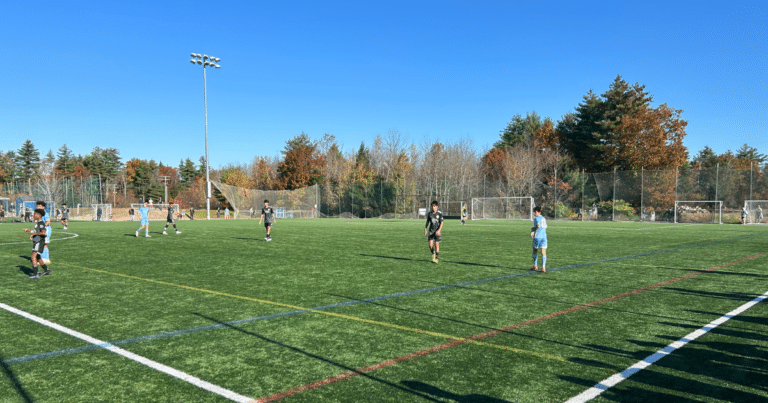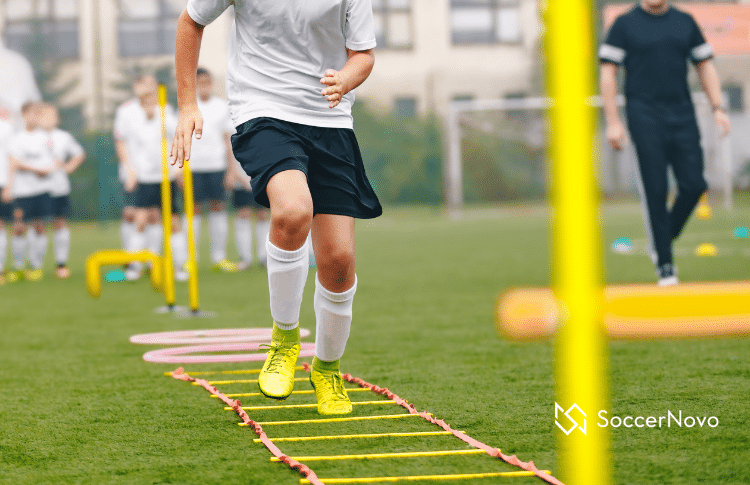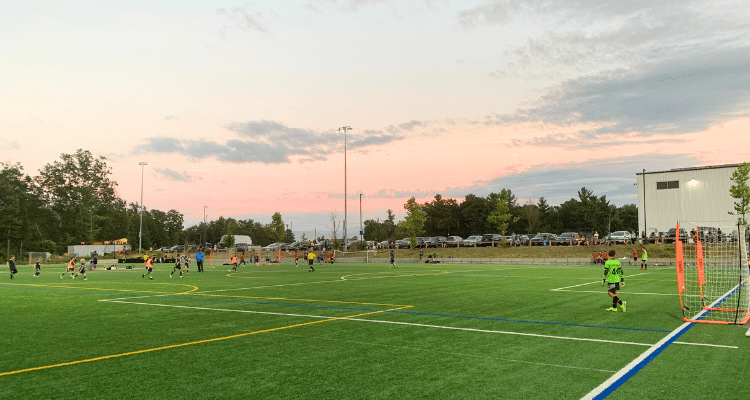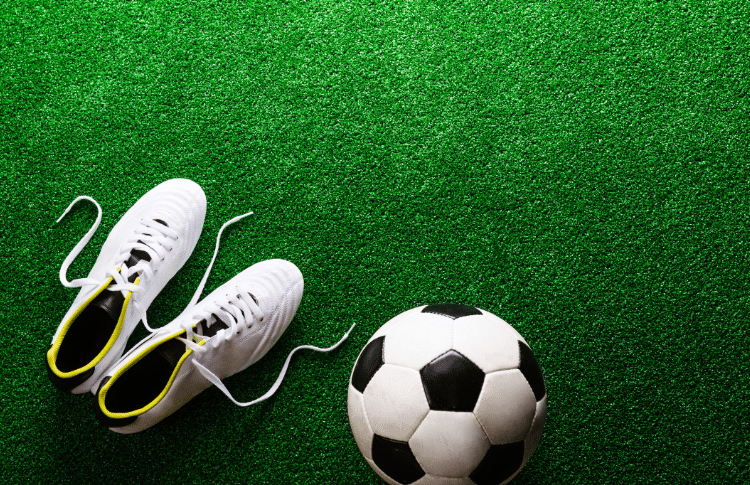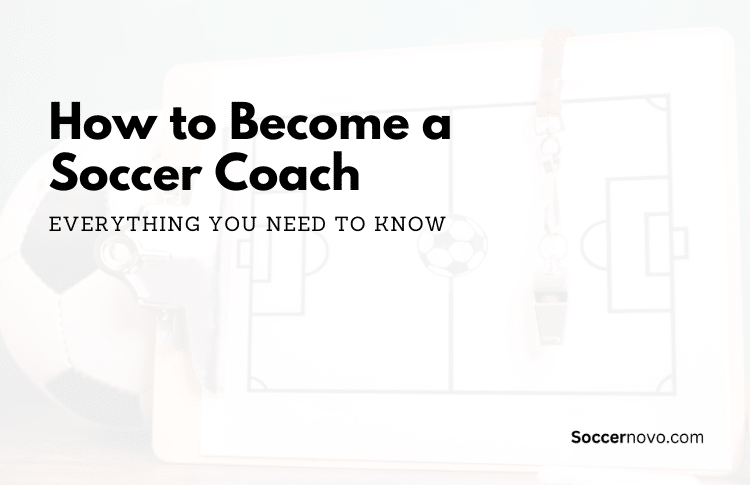Soccer Tryouts: Keys to Success

Soccer tryouts (or ID sessions) are an exciting time for both coaches and players alike. There’s a new buzz in the air and it marks a fresh start to the season.
For coaches, it’s a chance to see new talent and build a strong team for the upcoming season.
For players, it’s an opportunity to showcase their skills and potentially earn a spot on the team.
However, tryouts can also be nerve-wracking and intimidating, especially for those who are new to the sport or trying out for a higher level team.
In this article, we’ll provide some useful tips and advice to help you prepare for soccer tryouts and increase your chances of making the team.
Remember, as a player, there’s times when you may not make the team you want to be on but realize that it’s okay! It may sting for the time being (which is normal) but it will pass. We’ve seen kids not make a certain team but come back next year a much better player. They used the experience as fuel for success.
5 Things You Can Expect During a Soccer Tryout
Even though there is no set standard for soccer tryouts, the process is usually simple once it officially begins.
There are five components to a typical soccer tryout. Of course, this depends on the coach, program and the amount of days the tryouts are held.
Here’s a video of Lowell High School’s soccer tryout for context…
1. Introductions
A tryout will usually begin with a quick introduction from the coach.
At the first session, the coach will introduce themselves and go over some basic ground rules.
Then there may be an opportunity to introduce yourself. A quick roll call or a thorough introduction will be required for the coach to know who they will work with.
If you do get called, speak loud and proud like you are excited to be a part of the tryout process. It’s always a great first impression.
2. A Warm-Up
Then comes the warm-up before the actual tryout drills and exercises begin.
A warm-up could include light jogging and stretching. But, it could also develop into individual ball work or passing patterns with a group of players.
During this stage, you don’t need to show your work rate. Instead, keep a good rhythm with the team.
3. More Advanced Physical Activities
The coach will then give you a series of exercises to test your athletic ability.
There will be a lot of running and sprinting involved in these workouts.
At this point, many coaches also implement a brief HIIT-style training for their athletes.
Physical fitness is an important part of the soccer game. Coaches want to see who stayed in shape during the offseason. If they had the choice, they’d rather focus on developing the team during the season and not getting players in shape.
4. Soccer-Focused Drills
Now we’ll move on to some soccer-specific drills. The following are examples of possible exercises:
- Dribbling
- Defending
- Goalkeeping
- Passing
The coach will want to get as many players involved as possible. They’ll probably set up one-on-one drills, 2v1, small sided scrimmages, passing patterns with and without defenders, one-touch shooting drills, etc.
The key for coaches is to see the skills of the players trying out. It provides an opportunity to compare players through the same set of drills.
5. A Scrimmage
Most tryouts conclude with a scrimmage. This is where players can showcase their skills in real game situations.
Additionally, this allows the coach to observe the players’ talents and abilities in a competitive setting.
For players, the key is to push yourself more than usual to be seen. Being too reserved in a situation like this could do players a disservice.
Keys to Success for Making the Team
Physical Preparation
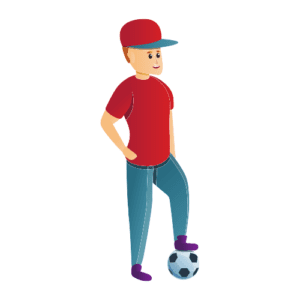
Preparing physically for soccer tryouts is essential for success. Players need to be in good shape and have the necessary skills to perform well during the tryouts.
Here are some key areas to focus on when preparing physically for soccer tryouts:
Cardiovascular Fitness
Soccer is a physically demanding sport that requires players to run for extended periods of time. Therefore, it is important to have good cardiovascular fitness.
During the offseason, soccer players should engage in regular cardiovascular exercise to improve their endurance.
HIIT training can also be helpful in improving cardiovascular fitness.
Strength and Conditioning
Players should also focus on strength and conditioning. This includes exercises to improve core strength, lower body strength, and upper body strength.
Squats, lunges, and planks are all great at-home exercises to improve core and lower body strength. Push-ups and pull-ups can be helpful in improving upper body strength.
Agility and Speed
Agility and speed are also important for soccer players. Players should work on drills to improve their agility, such as ladder drills or cone drills. Speed can be improved through sprinting exercises or interval training.
Flexibility
Flexibility is also important for soccer players. Stretching before and after workouts can help improve flexibility and prevent injuries. Yoga or Pilates can also be helpful in improving flexibility.
Nutrition
Nutrition is an important aspect of physical preparation for soccer tryouts. Players should eat a balanced diet that includes plenty of protein, carbohydrates, and healthy fats. Hydration is also important, so players should drink plenty of water before, during, and after workouts.
Here’s what to eat – by the hour – before your tryout.
By focusing on these key areas of physical preparation, players can improve their chances of success during their tryouts. Offseason preparation is vital if players want to be ready to showcase their talents on the soccer field.
Mental Preparation
Soccer tryouts can be a stressful time for players. Mental preparation is an essential aspect of success in soccer tryouts.
Players who are mentally prepared for the tryouts can perform better and show their skills to the coaches.
Here are some mental preparation techniques that can help players to perform at their best during soccer tryouts.
Visualization Techniques
Visualization is a powerful mental technique that can help players to prepare for soccer tryouts.
Visualization involves imagining yourself performing well in the tryouts.
Visualization can help players to build confidence and reduce anxiety.
Here are some visualization techniques that players can use to prepare for soccer tryouts:
- Visualize yourself performing well in the tryouts.
- Imagine yourself making successful passes, scoring goals, and making clean tackles.
- See yourself stepping on the grass or turf with full confidence in yourself
Positive Self-Talk
Positive self-talk is another mental technique that can help players to prepare for soccer tryouts. Positive self-talk involves using positive statements to boost your confidence and reduce anxiety.
Here are some positive self-talk techniques that players can use to prepare for soccer tryouts:
- Use positive statements such as “I am confident and prepared for the tryouts.” Or, “I’ve put in the hard work, now it’s time to show off my talents. I’m ready.”
- Avoid negative self-talk such as “I am not good enough for the team.”
- Use positive affirmations to build confidence and reduce anxiety.
- Repeat positive statements to yourself before and during the tryouts.
- As an added layer, make positive statements in front of a mirror.
Visualization and positive self-talk isn’t just for players who lack confidence. It is an essential part of the preparation process for athletes. In fact, many professional athletes will go through this before they have their game.
Attitude and Work Ethic
Before we get into the soccer skills, having a positive attitude and strong work ethic are essential keys to success in soccer tryouts.
In this day in age, coaches are not only looking for players who are skilled and talented, but also those who are willing to put in the effort and work hard to improve.
When attending tryouts, it’s important to approach each session with a positive attitude. This means being enthusiastic, confident, and open to learning new skills and techniques.
Coaches are looking for players who are coachable and willing to take feedback and apply it to their game.
Additionally, having a strong work ethic is crucial. This means showing up to tryouts on time, being prepared and ready to play, and giving 100% effort during each session.
Coaches are looking for players who are dedicated and committed to the sport, and who are willing to put in the time and effort to improve their game.
One way to demonstrate a strong work ethic is by being proactive and taking initiative. This means asking questions, seeking feedback, and taking the initiative to work on areas of your game that need improvement.
Coaches appreciate players who are self-motivated and take responsibility for their own development.
Technical Skills
Technical skills are the bread and butter of the game. These skills are the foundation of every player’s ability to perform on the field.
Here are a few key technical skills that every player should focus on before heading to tryouts.
Dribbling
Dribbling is the ability to move the ball with your feet while maintaining control. It’s an essential skill for all soccer players, regardless of position.
Dribbling can be practiced through a variety of drills, including cone dribbling, figure-eight dribbling, and zig-zag dribbling.
Players should focus on keeping the ball close to their feet and using both the inside and outside of their feet to maneuver around defenders.
And, always keep your head up, the ball should be an extension of your feet.
Passing
Accurate passing can create scoring opportunities and keep possession of the ball.
Players should practice passing with both feet, using the inside of the foot for short passes and the laces for longer passes.
It’s also important to practice passing under pressure, as this is often the case during a game.
Many coaches are moving towards quicker play. They want to see their players take one-touch and play it to another teammate. So work on passing off of one or two touches. Pinging the ball during tryouts can separate players during tryouts.
Shooting
Shooting is the ultimate goal of soccer, and every player should have a strong shot in their arsenal.
Players should focus on proper technique, including keeping the head down, striking the ball with the laces, and following through with the shot.
Remember though, it’s not all about the velocity. Placement is also key especially for younger players.
Defending
Defending is often overlooked when it comes to technical skills, but it’s just as important as any other skill on the field.
Players should practice defending one-on-one, as well as in a team setting. Proper technique includes staying on the balls of the feet, jockeying the attacker, and timing tackles correctly.
Goalkeeping
Goalkeeping is a unique position in soccer, and it requires a specific set of technical skills.
Goalkeepers should practice their footwork, diving, and catching techniques.
They should also work on their distribution, as they are often responsible for starting attacks from the back.
Intangible & Tactical Skills
While soccer tryouts require a wide range of skills, tactical skills are perhaps the most important.
Players who can read the game, anticipate their opponents’ moves, and make quick decisions are highly valuable to coaches.
Here are some key tactical skills to focus on during tryouts:
Positioning
One of the most important tactical skills for any soccer player is positioning. This means knowing where to be on the field at any given time.
Players should be aware of their team’s formation and their role within it. They should also be able to read the game and adjust their positioning as needed.
For example, a defender may need to step up and mark an opposing player who has moved into their area of the field. Or, a wing player should come back and cover for a back who is out of position.
Movement Off the Ball
Making runs and creating space to receive passes is an intangible that is so important in the game of soccer.
Players who can make intelligent runs and create opportunities for themselves and their teammates are highly valuable.
They should also be able to recognize when to make a run and when to hold their position.
Passing and Vision
Good passing and vision are essential assets to any team.
Players should be able to make accurate passes, both short and long, and should be able to read the game and anticipate where their teammates will be.
They should also be able to see the whole field and make quick decisions based on what they see.
Anticipating where players will be often comes with more experience but is such a unique characteristic of an elite player.
Defensive Skills
Finally, players should have strong defensive skills.
This means being able to mark opposing players, intercept passes, and make tackles. Players should also be able to communicate with their teammates and work together to defend as a unit.
A player who can make strong and clean tackles will put themselves in a great position to make any team.
Conclusion
Having a great tryout actually starts months before the actual ID day. Being physically and mentally prepared by putting in the work beforehand can set players up for success.
If you are trying out for a competitive soccer club, the worst thing players can do is not touch a soccer ball for a couple months and just show up and play.
Your talents might bet you far but consistent work is an important ingredient in a players success. There’s always players who are willing to put in the hours because they love it.
I’ve seen it firsthand, where a player peaks at 11 because they had a special talent but stopped training. They relied too much on their gifts.
On the other hand, I’ve seen mediocre players turn into D1 and pro players because they were grinders. They put in the daily work it took to be an elite soccer player.
The choice is really up to you. But, if you are serious about developing your skills and making the team, don’t leave it up to faith.
Instead, prepare today because that’s all you can control.
I hope this article has helped you. And, good luck!!

Written By: SoccerNovo
SoccerNovo is an independent youth soccer media brand built to help parents, players, and coaches better understand the game and the pathways available in U.S. soccer. Our mission is to make youth soccer simpler, clearer, and more accessible for everyone involved in it.
Let’s connect


